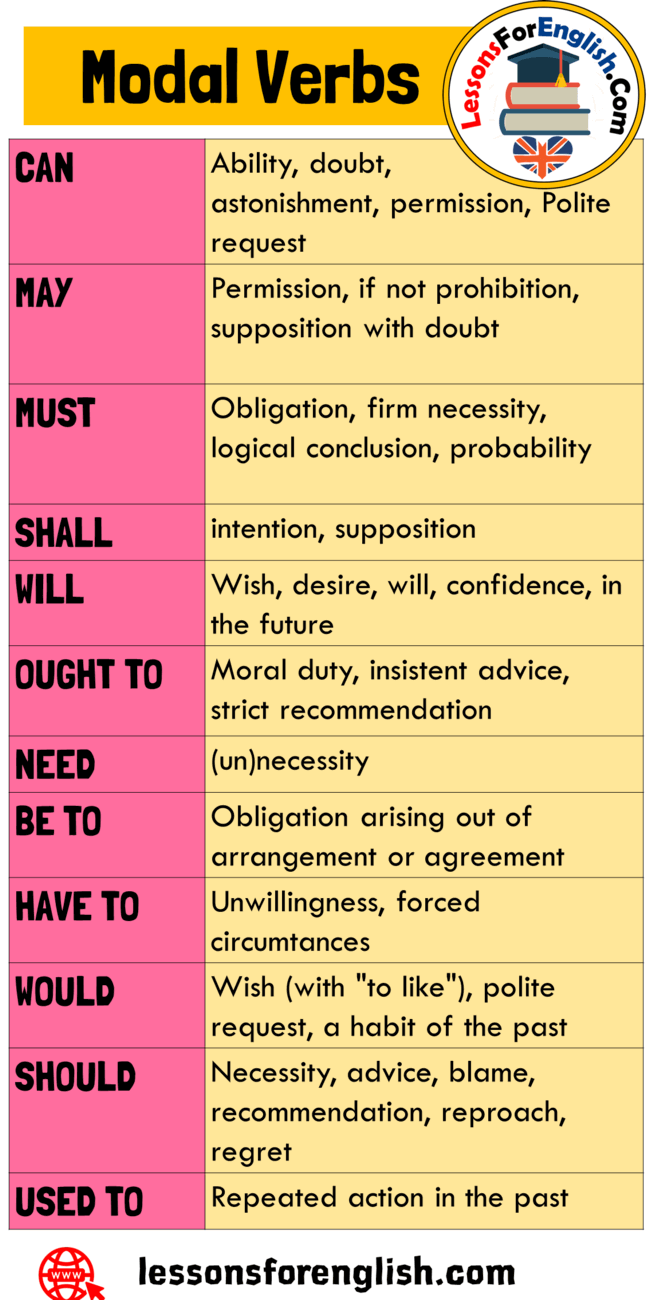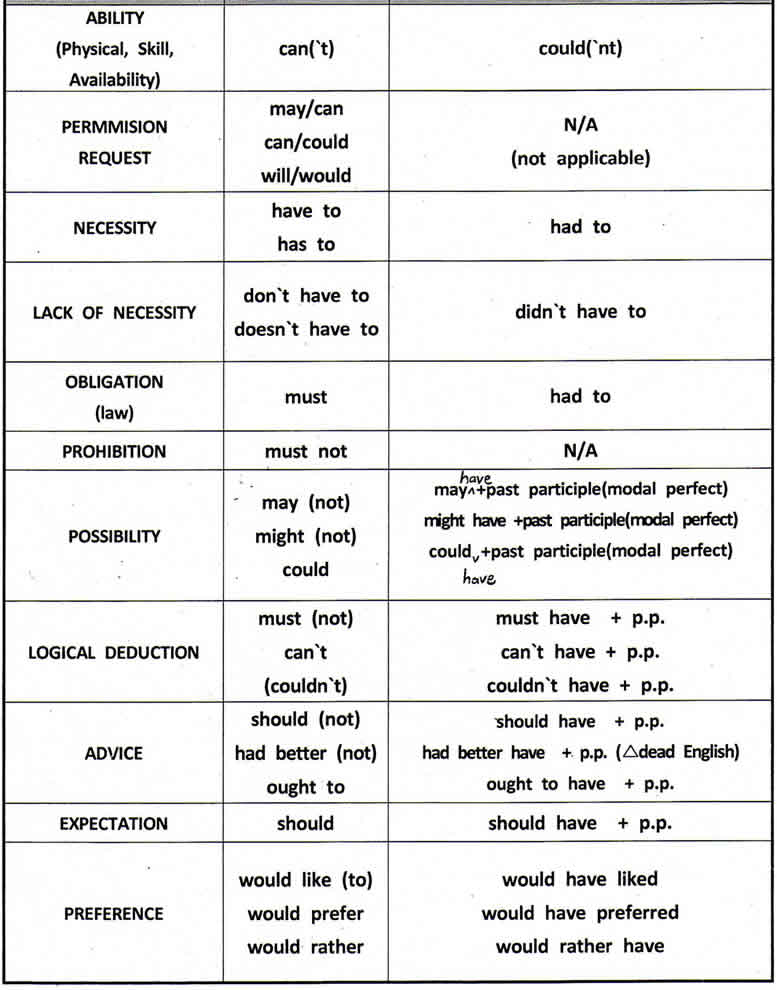
Modal Verbs In English : Modal Verbs in English | English grammar, Teaching english .... The modal verbs in english grammar are can, could, may, might, must, need not, shall/will, should/ought to. English modal verbs are used together with the base form of another verb. The modal verbs of english are a small class of auxiliary verbs used mostly to express modality (properties such as possibility, obligation, etc.). We outline the modal verbs english with examples and explanations. The modals of english are a small class of auxiliary verbs used mostly to express modality (properties such as possibility, obligation, …). The principal modal verbs include can, must, may, might, will, would, should. We can use verbs such as 'must' or 'should' to say when something is necessary or unnecessary, or to give advice.
Then put your knowledge to the test in the interactive. In english, modal verbs are a small class of auxiliary verbs used to express ability, permission, obligation, prohibition, probability there are many other examples of modal verbs expressing different modalities towards different verbs, but hopefully this guide has gone some way. Like the bulbous garlic, modal verbs change other verbs in a sentence. Modal verbs are used to express ability, obligation, permission, assumptions, probability and possibility, requests and offers, and advice. It is used instead of will only in formal english. Each modal verb can have more than meaning which depends on the context of that sentence (or question). A modal is a type of auxiliary (helping) verb that is used to express: We can use verbs such as 'must' or 'should' to say when something is necessary or unnecessary, or to give advice.
English modal verbs are used together with the base form of another verb.
The verbs or expressions dare, ought to, had better, and need not behave like modal auxiliaries to a large extent and my be added to the above list. They are special because they behave differently from other verbs in english: Using modal verbs can be complicated. Grammarhere 2 years ago no comments. English modal verbs are used together with the base form of another verb. After a modal verb, the root form of a verb is generally used. English modal verbs are special verbs that are used to show possibility, ability, permission, and so forth. The modal verbs of english are a small class of auxiliary verbs used mostly to express modality (properties such as possibility, obligation, etc.). Here are some easy explanations and lots of exercises. 1 what is a modal verb? Modal verbs and are used to indicate the modality of an event, that is, the likelihood of something happening. Learn about the usage of modal verbs and their alternative forms in english grammar with lingolia's online lesson.
They are used with other verbs to express ability, obligation, possibility, and so on. We outline the modal verbs english with examples and explanations. Learn about the usage of modal verbs and their alternative forms in english grammar with lingolia's online lesson. Auxiliary verbs cannot be used on their own and appear with a main verb. 2 list of modal english verbs. Modal verbs and are used to indicate the modality of an event, that is, the likelihood of something happening. Like the bulbous garlic, modal verbs change other verbs in a sentence. What is a modal verb? Modals are special verbs, such as can or must, which behave very irregularly in english. Modal verbs are used to express ability, obligation, permission, assumptions, probability and possibility, requests and offers, and advice.

English modal verbs are used together with the base form of another verb.
To offer of assistance or polite suggestion (when you are not. Can may must shall will. Certain other verbs are sometimes, but not always, classed as modals. We outline the modal verbs english with examples and explanations. The word to should not appear after a modal verb. Modal verbs and are used to indicate the modality of an event, that is, the likelihood of something happening. A modal is a type of auxiliary (helping) verb that is used to express: An exception is the phrase ought to, which is considered a modal verb. No, i'm afraid that doesn't work. The modal verbs of english are a small class of auxiliary verbs used mostly to express modality (properties such as possibility, obligation, etc.).
Using modal verbs can be complicated. Each modal verb can have more than meaning which depends on the context of that sentence (or question). They are used with other verbs to express ability, obligation, possibility, and so on. The verbs or expressions dare, ought to, had better, and need not behave like modal auxiliaries to a large extent and my be added to the above list. English modal verbs are used together with the base form of another verb. We can use verbs such as 'must' or 'should' to say when something is necessary or unnecessary, or to give advice. The modal verbs of english are a small class of auxiliary verbs used to express possibility, obligation, advice, permission, ability What is a modal verb in english? Modal verbs are a kind of auxiliary or helping verb. Grammarhere 2 years ago no comments.

The word to should not appear after a modal verb.
An exception is the phrase ought to, which is considered a modal verb. Ability, possibility, permission or obligation. The modal verbs of english are a small class of auxiliary verbs used to express possibility, obligation, advice, permission, ability In fact, they make the sentence adopt to one of the following four purposes founded in 1996, ef english live has been at the cutting edge of language learning for nearly two decades, having been the first to pioneer a. Then put your knowledge to the test in the interactive. The modal verbs of english are a small class of auxiliary verbs used mostly to express modality (properties such as possibility, obligation, etc.). Using modal verbs can be complicated. We can use verbs such as 'must' or 'should' to say when something is necessary or unnecessary, or to give advice. English modal verbs are special verbs that are used to show possibility, ability, permission, and so forth. Modal verbs are used to express ability, obligation, permission, assumptions, probability and possibility, requests and offers, and advice.
We can use verbs such as 'must' or 'should' to say when something is necessary or unnecessary, or to give advice modal verbs. In fact, they make the sentence adopt to one of the following four purposes founded in 1996, ef english live has been at the cutting edge of language learning for nearly two decades, having been the first to pioneer a.

Modal verbs are used to express ability, obligation, permission, assumptions, probability and possibility, requests and offers, and advice.

Modals are special verbs, such as can or must, which behave very irregularly in english.

Modal verbs are auxiliary verbs (also called helping verbs) like can, will, could, shall, must, would, might, and should.

Shall is only used with i or we.

Auxiliary verbs cannot be used on their own and appear with a main verb.

Modal verbs are a kind of auxiliary or helping verb.

We outline the modal verbs english with examples and explanations.

The modals of english are a small class of auxiliary verbs used mostly to express modality (properties such as possibility, obligation, …).

Certain other verbs are sometimes, but not always, classed as modals.

To offer of assistance or polite suggestion (when you are not.

The word to should not appear after a modal verb.

Certain other verbs are sometimes, but not always, classed as modals.

Can may must shall will.

After a modal verb, the root form of a verb is generally used.

Can may must shall will.

After a modal verb, the root form of a verb is generally used.

An exception is the phrase ought to, which is considered a modal verb.

The verbs or expressions dare, ought to, had better, and need not behave like modal auxiliaries to a large extent and my be added to the above list.

After a modal verb, the root form of a verb is generally used.

Shall is only used with i or we.

Modal verbs affect the main verb they are associated with by expressing the level of possibility, ability, permission and obligation for that action or state.

We can use verbs such as 'must' or 'should' to say when something is necessary or unnecessary, or to give advice.

Ability, possibility, permission or obligation.

To offer of assistance or polite suggestion (when you are not.

An exception is the phrase ought to, which is considered a modal verb.

The word to should not appear after a modal verb.

In fact, they make the sentence adopt to one of the following four purposes founded in 1996, ef english live has been at the cutting edge of language learning for nearly two decades, having been the first to pioneer a.

The modal verbs of english are a small class of auxiliary verbs used to express possibility, obligation, advice, permission, ability

Can may must shall will.

Learn about the usage of modal verbs and their alternative forms in english grammar with lingolia's online lesson.

English modal verbs are used together with the base form of another verb.

2 list of modal english verbs.

An exception is the phrase ought to, which is considered a modal verb.

Learn about the usage of modal verbs and their alternative forms in english grammar with lingolia's online lesson.
0 Komentar